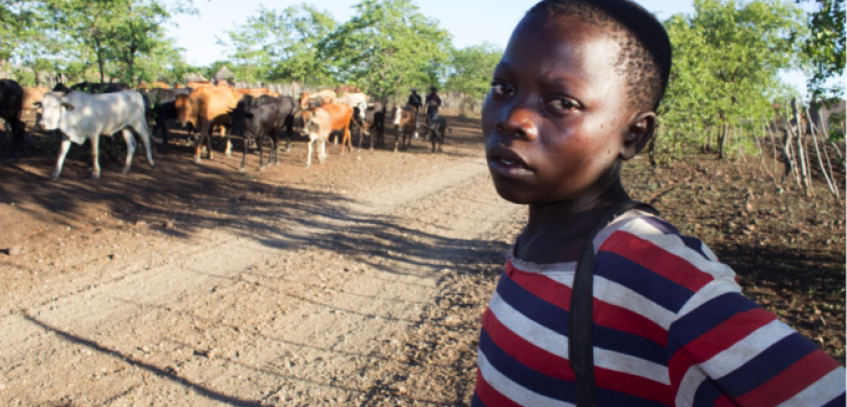Louis, 13, has to walk over 20 kilometres every day in the scorching heat. He sets off at 4am before sunrise and returns home after dark. Yet, it’s not school he’s making his way to.
“I don’t go to school, I am employed,” says Louis. “I left primary school when I was 10. I wish I could go back to school, but where would I start? The other students will be much younger than me. It is not realistic anymore. I am stuck here with the cattle.”
Louis used to live with his grandmother, but he wasn’t been taken care of as he’d hoped.
“My mother died and I believe my father is somewhere in South Africa, I do not even remember him. My grandmother has failed to take care of me. That’s why my uncle got me a job to herd cattle. They brought me here, I have been living with my employer for three years now.”
Louis’ grandmother and uncle live 30 kilometres away. He rarely visits, but is in touch with them.
For all his hard work, Louis receives a cow every year. “I don’t get money from this job, I have assurance that I have a cattle at the end of the year. My boss buys me clothes here and there. His wife cooks supper for us. At least we get food.”
So far the employer has been faithful, Louis has earned three cows which he has given to his grandmother.
“Herding cattle in this dry land is difficult. There is no grazing land, no water for these animals. I feel lonely sometimes in the bush. I work with 2 other boys aged 16 and 17. They have become my brothers. Together we herd 65 cows, there used to be close to 72 but the rest died with diseases and others just fell and died in this heat. My employer was not happy with the reports of cattle dying, one day we reported 4 deaths, it was a sad day for us too because herding these cattle earns us a living.”
As the El Niño induced drought strengthens, the situation is only getting more and more difficult for Louis.
“This year is the worst,” says Louis. “Other families used to secretly ask us to take their cattle with our herd. They’d give us 50 cents per beast, every day. Some people still give us beasts, but the payments are not regular.”
Life is tough for Louis. His playground is in the wild, his only food pounded corn and a bottle of fermented maheu (a mixture of porridge and sorghum).
“We get very thirsty in the bush, so we make sure we drink from any water point first before the cattle do. Sometimes we chew tree bucks for the moisture,” says Louis. “My wish is that I continue herding cattle until I am 16 at least. Then, I want to cross over to South Africa but I will go with a valid passport. So if I sell my cows at a good rate I will be able to afford to take my birth certificate, ID and passport, leave my grandmother and sister with some money then look for a job.”
Plan International Zimbabwe is responding the El Niño situation and is providing food and nutrition aid, emergency water supply, food in schools as well as putting child protection measures in place.
Plan International Zimbabwe is committed to working closely with the government and other agencies and monitoring the status of children, families and communities in the affected areas.
Contact:
Angela Machonesa, Regional Communications Specialist (RESA); Tel: +263 772380 002; Email: angela.machonesa@plan-international.org
Notes to editors
- The Government of Zimbabwe has declared a state of disaster given the unfolding El Nino induced drought.
- It is estimated that 30% of the population are food insecure, equating 2.8 million people. It is feared it could reach 5 million in the next lean season
- Current food aid is only meeting a small percentage of those in need,
- The main rural livelihoods – cultivation, on farm labour, remittances are all reducing
- The drought is affecting the school attendance as well as access to healthcare
- Irrigation and small grains have eased the situation, however wells and boreholes are drying up and need rehabilitation








